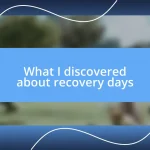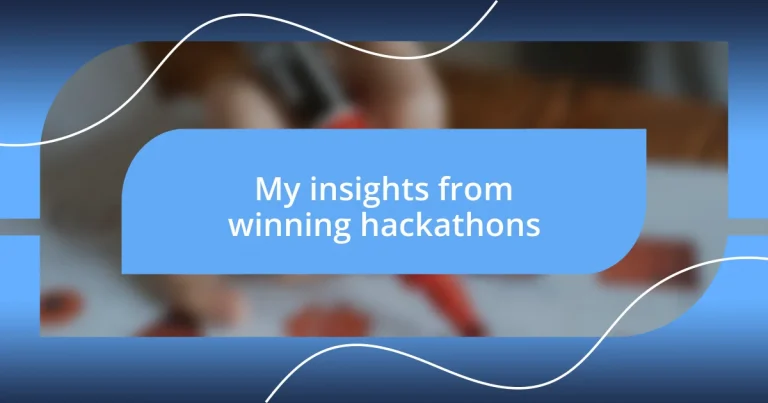Key takeaways:
- Hackathon culture emphasizes collaboration, creativity, and shared passion, fostering a close-knit community even within a short timeframe.
- Preparation is essential, including forming diverse teams, setting clear goals, and gathering resources to enhance productivity and confidence.
- Learning from experiences, embracing feedback, and reflecting on projects help refine teamwork and inform future endeavors, ultimately fueling innovation.

Understanding hackathon culture
Hackathon culture thrives on collaboration and creativity, creating an electrifying atmosphere. I remember my first hackathon; the sheer energy in the room was palpable—developers, designers, and innovators huddled together, exchanging ideas while the clock ticked down. In that space, you realize how shared passion can dissolve barriers and ignite breakthroughs.
Participating in these events often feels like being part of a close-knit community, even if just for a weekend. How often do you get to work side by side with people from varying backgrounds, united by a goal and a limited timeframe? I think back to a team I joined, where we bonded over late-night snacks and shared challenges. Those moments not only fostered friendships but also built a sense of camaraderie that kept us motivated.
The emotions run high during hackathons—there’s the excitement of brainstorming, the stress of deadlines, and that euphoric rush when your code finally compiles. Have you experienced the thrill of perfecting a project right before the presentation? I still get goosebumps remembering the applause as we unveiled our creation, a testament to the late nights and collaborative spirit. This unique blend of emotions truly encapsulates the essence of hackathon culture.

Preparing for a hackathon
Preparing for a hackathon is more than just signing up; it’s about arming yourself with the right tools and mindset. I learned early on that a little preparation can go a long way. The excitement can often overshadow the practical aspects, but when I arrived prepared, I felt more confident tackling challenges.
Here are some key steps I recommend:
- Form a diverse team: Having individuals with different skill sets can enhance creativity and problem-solving.
- Choose the right tools: Familiarize yourself with libraries and frameworks that can expedite your workflows.
- Set goals: Outline what you want to achieve before the event, whether it’s learning something new or finishing a project.
- Gather resources: Create a shared document with useful links, tutorials, and ideas your team can reference.
On a personal note, I remember the night before my first hackathon, I set up my laptop and organized my coding resources. The next day, having everything at my fingertips made all the difference. We hit the ground running, and I could feel my energy building as we shaped our project. It transformed the way I approached future hackathons; preparation truly is a game changer.

Building a winning team
Building a winning team during a hackathon is crucial. From my own experience, I can’t emphasize enough how the diversity of skills within a team can spark groundbreaking ideas. For instance, there was a time when our group had a mix of developers, a designer, and a marketing genius. The interplay of their skills was electrifying; our design came to life seamlessly while marketing insights pushed us to think about user experience from day one.
Trust and communication form the backbone of any successful team. Reflecting on a hackathon where I struggled with code, I was surprised at how the team’s open dialogue helped find a solution. It was that supportive environment that allowed me to express my concerns without hesitation. We brainstormed together, and that shared vulnerability led to innovative ideas we’d never have reached alone.
Collaboration is truly the heart of a winning team, especially when the clock is ticking. In one memorable hackathon, when we hit a roadblock, we took a step back and re-evaluated our approach. We gathered around a whiteboard, and that chaotic session of sketching and idea-sharing morphed into clarity and renewed energy. The laughter, mixed with focused brainstorming, reminded me how important it is to enjoy the journey together, making every challenge feel like a collective mission rather than an individual burden.
| Team Aspect | Importance |
|---|---|
| Skill Diversity | Encourages creativity and unique solutions |
| Trust and Communication | Fosters open dialogue and problem-solving |
| Collaboration | Transforms challenges into shared missions |

Choosing the right project
Choosing the right project can set the tone for your entire hackathon experience. It’s not just about finding something that seems impressive; it’s about choosing a project that resonates with your team’s strengths and interests. I once participated in a hackathon where we almost settled on a complex AI project because it was trending. Thankfully, we paused and realized we were more passionate about solving a community issue. It was then that the excitement in the room soared, and I learned firsthand that passion can fuel innovation.
Another important factor in selecting a project is feasibility within the time constraints. I remember a hackathon where our team got carried away with a grand vision, only to scramble at the end to implement a fraction of our ideas. It’s crucial to assess your goals against the hours available. Have you ever been in a situation where ambition clashed with reality? Tailoring your project to something manageable not only boosts morale but also enhances the chances of success.
Lastly, engaging with potential users during the ideation phase can significantly streamline your project choices. I’ve found that interviews or surveys can reveal real needs that guide your brainstorming process. One time, we engaged with local entrepreneurs and transformed their feedback into our hackathon project. The concept was rooted in genuine insight, which made presenting it that much more rewarding. Trusting that your project addresses a real problem can make a world of difference in how your team values their work and what they bring to the table.

Effective presentation techniques
When it comes to effective presentation techniques, I believe storytelling is a game-changer. You know those moments when you’re not just sharing facts but weaving a narrative? I recall a hackathon pitch in which I shared not just what we built but why we built it. Incorporating an emotional journey captivated the judges and brought our vision to life; suddenly, the tech wasn’t just code, it was part of a larger story.
Visual aids can also make or break your presentation. In one instance, I realized how powerful a simple infographic could be. Instead of plunging into dense slides filled with text, I opted for clear visuals that highlighted our project’s impact. Did I mention how this kept our audience engaged? Seeing lights go on in people’s eyes as they grasped the key points of our project was incredibly satisfying.
Finally, practicing your delivery is essential. I’ve experienced how sounding natural can be just as important as the content. Before another hackathon, I rehearsed in front of friends, welcoming their feedback. This practice helped me refine my pacing and boost my confidence. Have you ever felt nerves creeping in during a pitch? By the time I hit the stage, I felt almost at home, which allowed our team’s passion to shine through and resonate with everyone present.

Learning from each experience
Learning from each experience in hackathons is crucial for personal and team growth. I vividly remember a moment from a hackathon where we made a significant mistake by not allocating enough time for our final touch-ups. The frantic rush to finish resulted in a presentation full of bugs—quite the humbling experience! It taught me the importance of every phase of the project, not just the coding part. Have you ever faced a similar setback that turned out to be a learning opportunity?
Every hackathon also offers a chance to refine our teamwork skills. I recall originally struggling with communication in a diverse team where everyone had different expertise. We learned to set aside our egos and developed a shared language to talk about our ideas. This not only fostered collaboration but also led to a more cohesive final product. In hindsight, I realized that embracing diverse perspectives can lead to richer, more innovative solutions.
Each hackathon wraps up with a treasure trove of insights, especially about user feedback. After one event, we received critique that initially stung, but it pushed us to dig deeper into our assumptions and strengthen our project. I’ve come to appreciate that the path to improvement often lies in embracing constructive criticism. Isn’t it fascinating how the most challenging feedback can be a catalyst for extraordinary growth?

Applying insights to future projects
I often find myself reflecting on the lessons learned during hackathons and how they shape my approach to future projects. For instance, I remember a time when we developed a product that resonated wonderfully with users, but I neglected to document the user testing process adequately. This oversight not only affected our understanding of user needs but also set us back in later projects. Moving forward, I’ve made it a priority to create a comprehensive feedback loop; ensuring that insights from each hackathon directly contribute to refining project scopes from the get-go. How often do we overlook vital processes in our rush to build?
Collaboration skills sharpened in hackathons have become a cornerstone of my project management style. I once teamed up with a graphic designer who had a completely different background than mine. Initially, our different approaches led to friction, but we gradually learned to harness our strengths creatively. Now, I actively seek diverse skill sets in future collaborations because it’s proven to fuel innovation. Why limit ourselves to familiar waters when venturing beyond can spark unexpected ideas?
I’ve discovered that post-hackathon reflections can be transformative. After one particular event, I sat down with my team and documented every challenge and triumph we experienced. This reflection turned into a valuable resource that informed our strategies for future projects. It’s made me realize the power of creating a collective memory; it serves not just as a guide but as a reminder of our growth journey. Have you ever taken the time to reflect on your path? You might be surprised at the insights waiting to be uncovered.













